Key takeaways:
- Portfolio critiques provide valuable feedback that fosters personal and artistic growth, helping photographers see their work from different perspectives.
- Engagement in photography forums creates a supportive community for shared learning, accountability, and renewed inspiration.
- Effective preparation for critiques includes setting intentions and being open to all types of feedback to enhance the creative process.
- Reflecting on critiques and keeping a journal of insights promotes ongoing development and exploration of new ideas in photography.
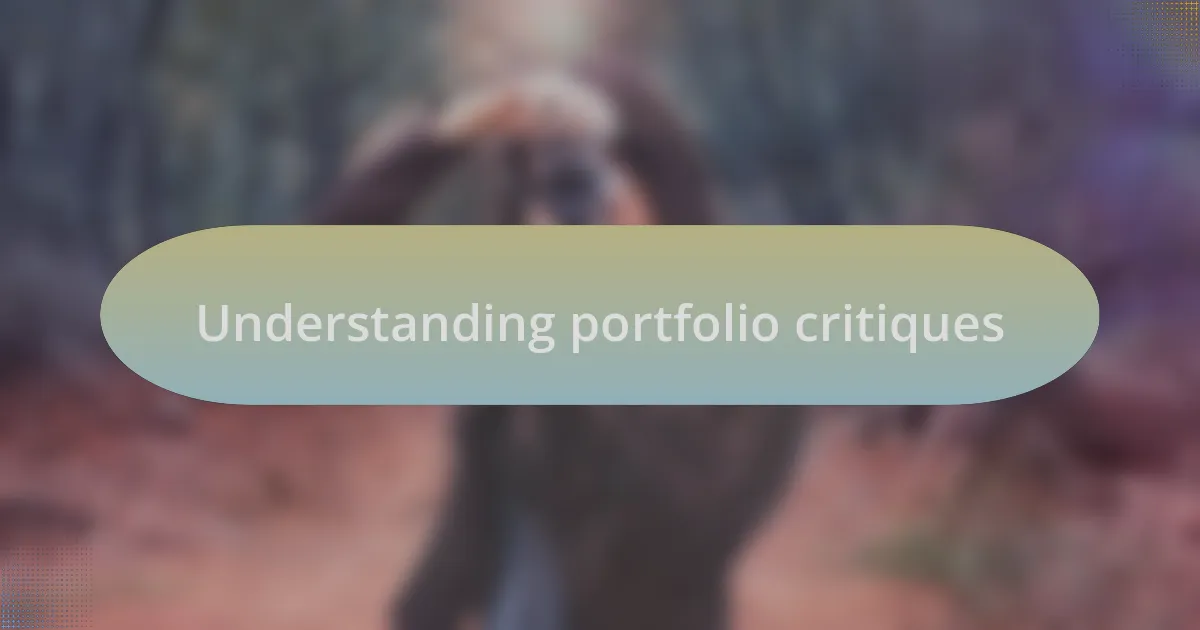
Understanding portfolio critiques
Understanding portfolio critiques is an essential part of growing as a photographer. I remember my first critique session; the nerves were palpable, but I quickly realized that constructive feedback was a powerful tool for improvement. Have you ever felt lost in your own work? Hearing diverse perspectives helped me uncover blind spots I never knew existed.
Critiques are not just about what’s wrong with your work; they can also shed light on what’s working well. I’ve often felt a sense of relief when others resonate with elements I thought were too subtle or even unworthy of attention. This affirmation fuels my creative fire. How often do we underestimate the power of shared appreciation?
Moreover, engaging with critiques can be an emotional journey that enhances our understanding of our own vision. It might sting to hear criticism, but I’ve learned to view it as an opportunity for growth rather than a personal attack. Have you ever thought about how scrutiny can push you to refine your skills? Embracing these discussions can elevate your artistry to new heights.
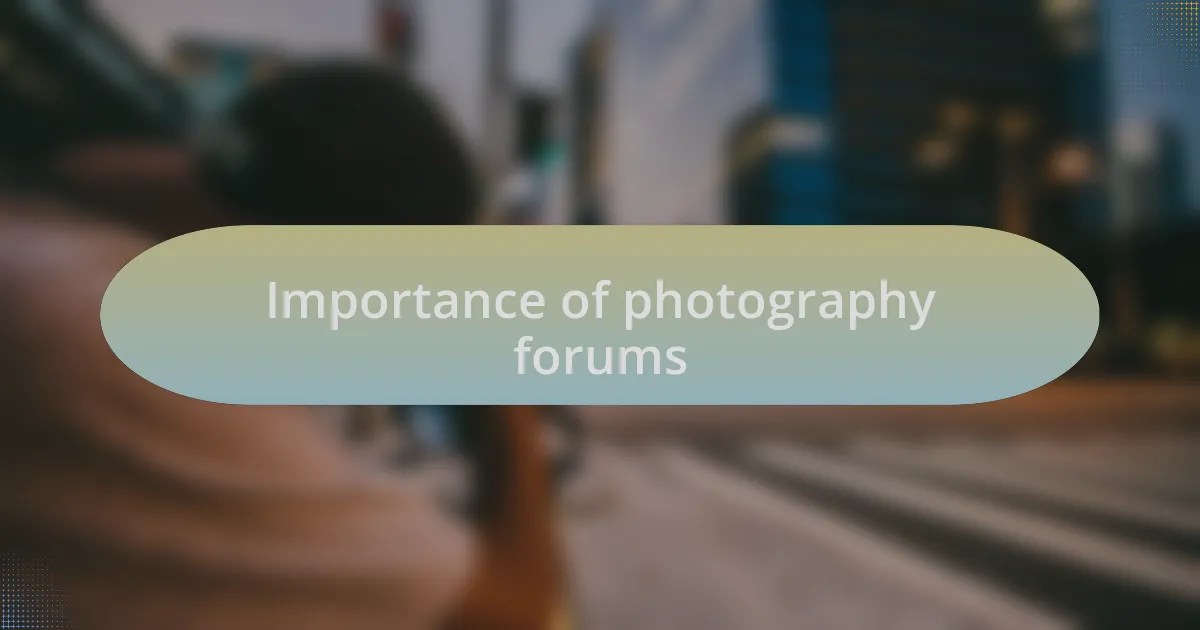
Importance of photography forums
Photography forums hold a unique importance in our creative journeys as they provide a space for communal learning and sharing. I vividly recall my first interaction on a forum, where a member’s candid advice transformed my approach to composition. It was a reminder that I wasn’t alone in my struggles; everyone was navigating this artistic path together.
In these forums, the diverse perspectives of fellow photographers can open up avenues for thought we might never have considered. When I shared a photo that I believed to be strong, a critique prompted me to question my use of lighting more critically. Isn’t it fascinating how someone else’s viewpoint can help us see our work through a different lens?
Moreover, being part of a photography forum creates a sense of accountability and motivation. There are moments when I feel stagnant, but seeing others share their progress pushes me to act. Have you ever noticed how the community’s energy can reignite your passion? Engaging with others in these forums helps cultivate a supportive environment that encourages growth and exploration.
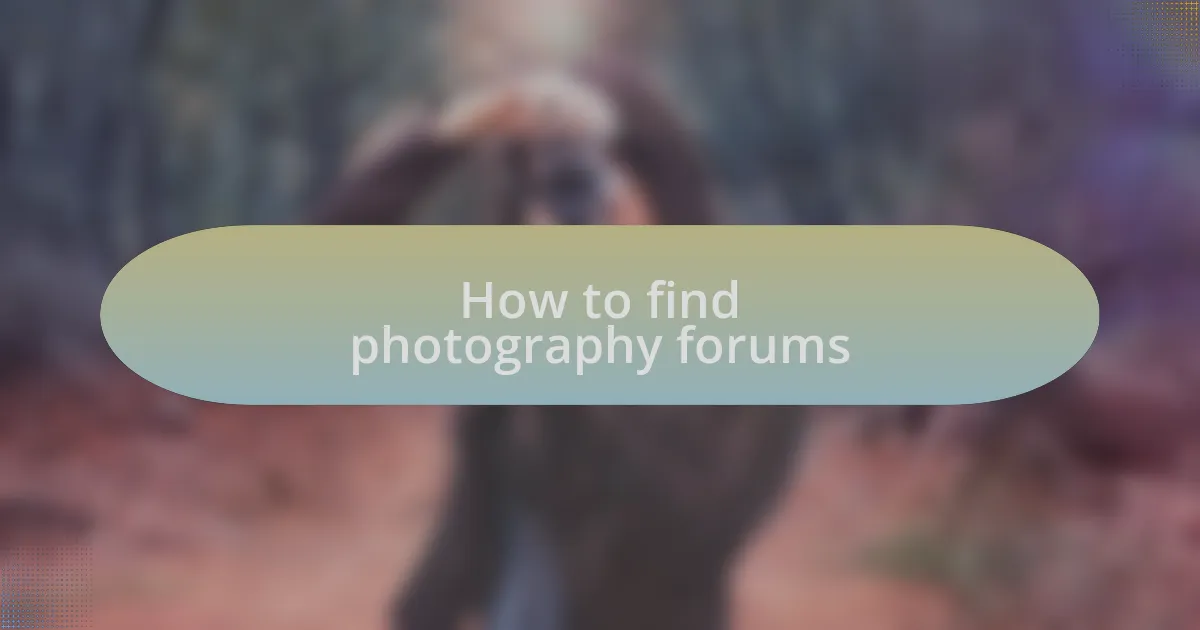
How to find photography forums
Finding photography forums can be an enriching experience if you know where to look. A simple search online for “photography forums” often reveals a treasure trove of options. I remember the thrill of stumbling upon a small niche forum dedicated to film photography; it felt like discovering a hidden gem where enthusiasts shared tips and stories that resonated deeply with my own experiences.
Social media platforms also play a crucial role in connecting us to photography communities. I found several vibrant groups on Facebook where members actively share their works and engage in constructive critiques. It’s almost like having a digital meetup space right at your fingertips, isn’t it? You just never know what insightful feedback or inspiration you might find in a casual scroll through these communities.
Don’t overlook the value of local photography clubs; they can be a fantastic way to meet fellow enthusiasts in person. After joining a local Meetup group, I was surprised by the wealth of knowledge shared in even the most casual conversations over coffee. It’s heartwarming to connect with people who share your passion, and it can spark new ideas for your own work. What better way to enhance your journey than by engaging with others who share the same love for photography?
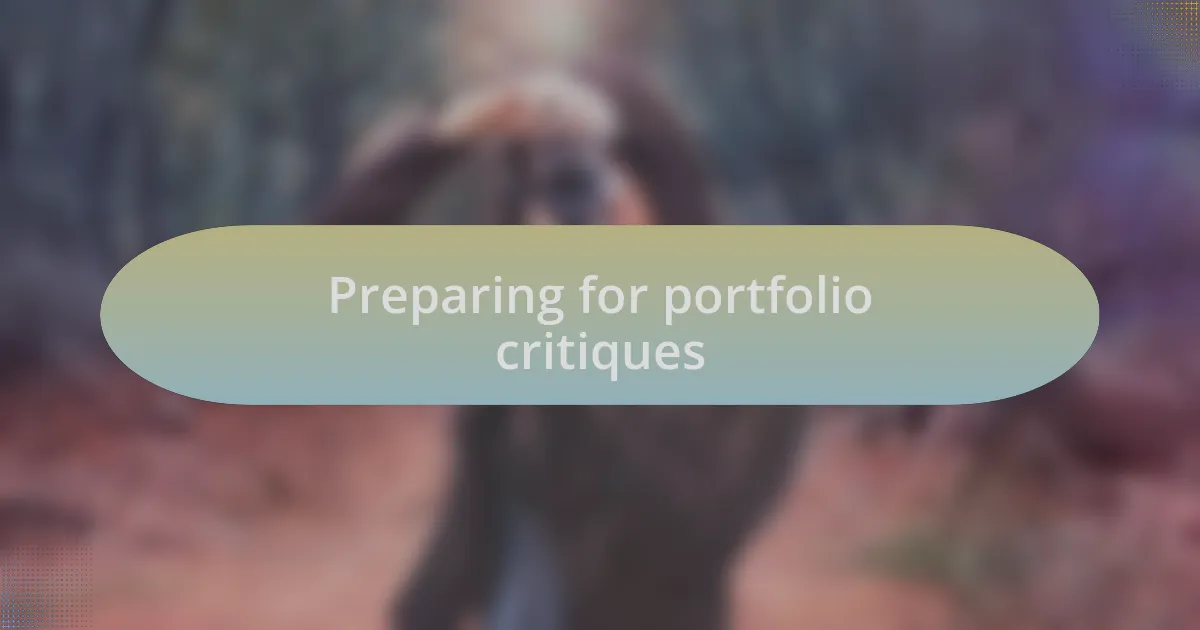
Preparing for portfolio critiques
Preparing for portfolio critiques requires a bit of mental and emotional readiness. I often find myself reflecting on the work I am about to present, almost like a mini-gallery walk through my creative journey. I ask myself, “What do I want to learn from this critique?” Setting my intentions helps guide the feedback I seek, making the entire experience more meaningful.
Before the critique, I also make it a point to gather my thoughts about my pieces. I write down specific elements I’m proud of and areas where I feel uncertain. This practice not only clarifies what I want feedback on but also helps me articulate my vision to others, fostering a more productive discussion. I remember once a critique led to completely rethinking my approach to composition after I expressed my concerns about balance in my images. It’s amazing how a little preparation can lead to breakthroughs.
Lastly, I ensure that I’m open to receiving all types of feedback. It can be tough to hear constructive criticism, especially when you’ve poured your heart into your work. I always remind myself that the aim is improvement and growth. I once sat through a critique where I initially felt defensive, but allowing myself to absorb the insights ultimately elevated my photography. What might you discover about your work if you approach critiques with an open heart?
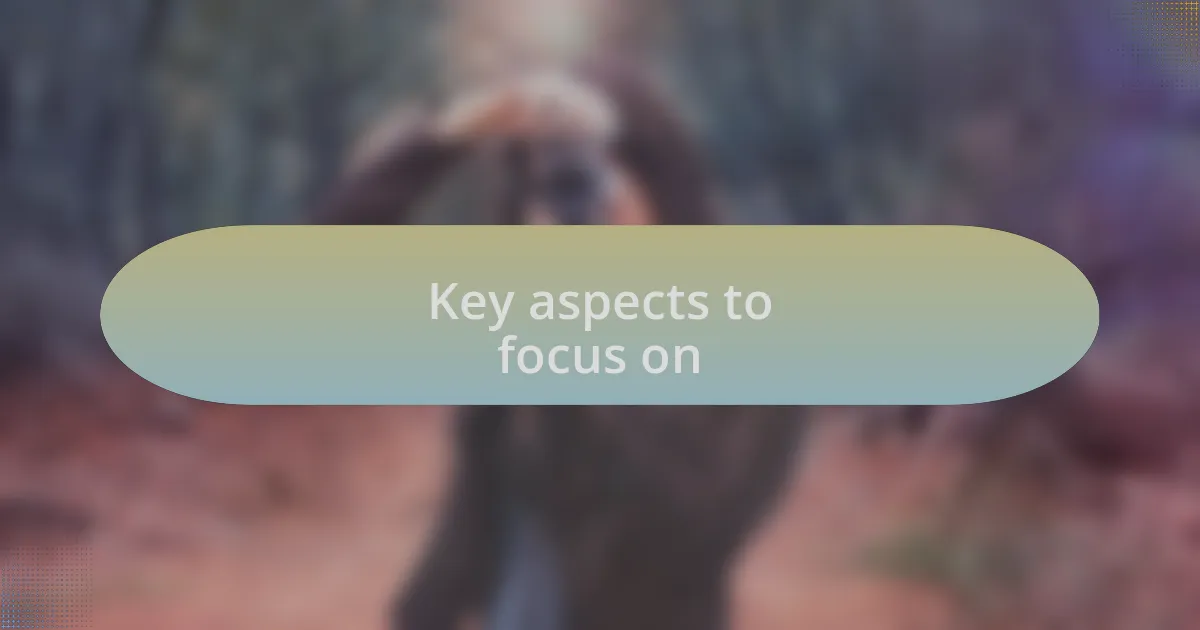
Key aspects to focus on
When engaging with portfolio critiques, it’s essential to focus on specific aspects of your work that resonate with you. For example, I find it beneficial to highlight the emotional connection behind certain images. In one session, I chose to showcase a photograph that captured a fleeting moment of joy. Sharing the story behind that image invited deeper discussions about the context and intent, leading to feedback that truly enriched my understanding.
Another key aspect is to remain receptive to diverse perspectives within the critique group. I recall a time when a fellow photographer pointed out a detail I had overlooked in my work. It was a small observation about color contrast that completely transformed how I viewed my piece. Engaging with different viewpoints fosters a dynamic environment where each critique can spark new ideas and growth.
Lastly, reflecting on the feedback received after the session is vital for personal development. After one critique, I spent hours revisiting my photos and the comments shared. I realized that I had been too attached to my original vision and had missed opportunities to explore different interpretations. How do you process the insights you gather from critiques? I encourage you to embrace them as stepping stones in your creative journey.
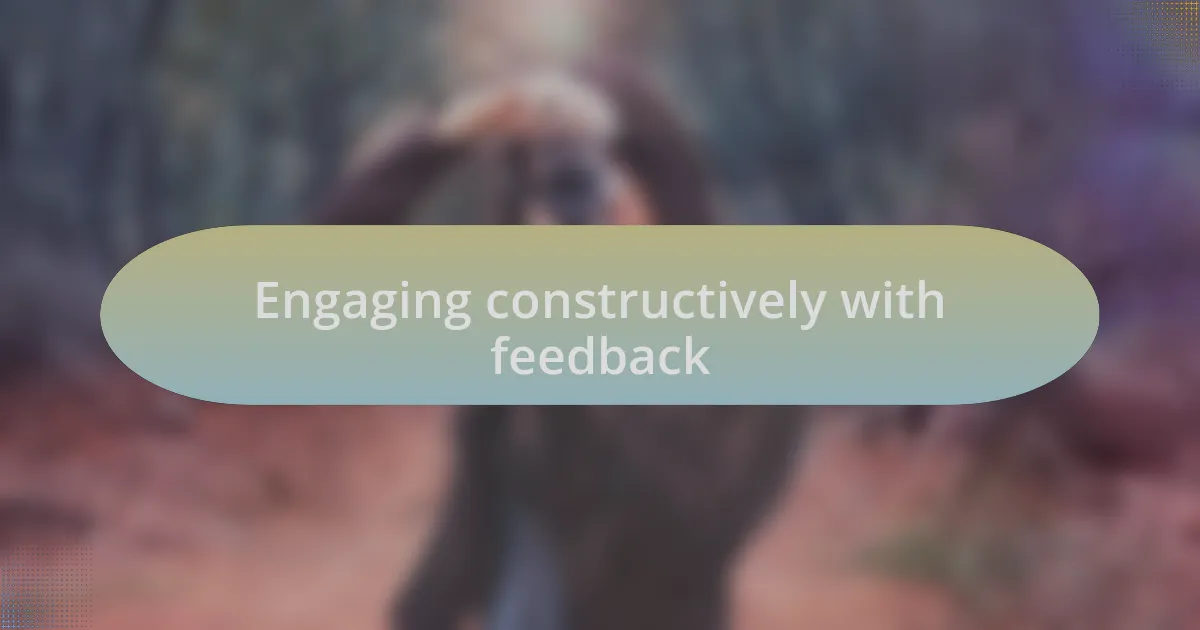
Engaging constructively with feedback
Engaging constructively with feedback is about active listening. I remember a critique session where a colleague suggested I experiment with light and shadow in my portrait series. Instead of feeling defensive, I leaned into their insights, and it transformed my approach. Have you ever considered how a simple suggestion could unlock another layer of creativity in your work?
It’s also essential to ask open-ended questions during critiques to encourage deeper dialogue. I once shared a series of landscape photographs and asked, “What feelings do these evoke for you?” The responses were illuminating; they revealed emotions I hadn’t anticipated, guiding me to reconsider my focus in future projects. How often do you seek not just comments, but meaningful conversations about your art?
Finally, I believe in the power of gratitude when receiving feedback. After one particularly challenging session, I took a moment to thank each participant for their time and insights. This practice not only fostered goodwill but also reinforced the idea that all feedback is a valuable contribution to my growth. How do you express appreciation for insights that might initially feel overwhelming? I’ve learned that embracing this mindset makes the process more collaborative and enriching for everyone involved.
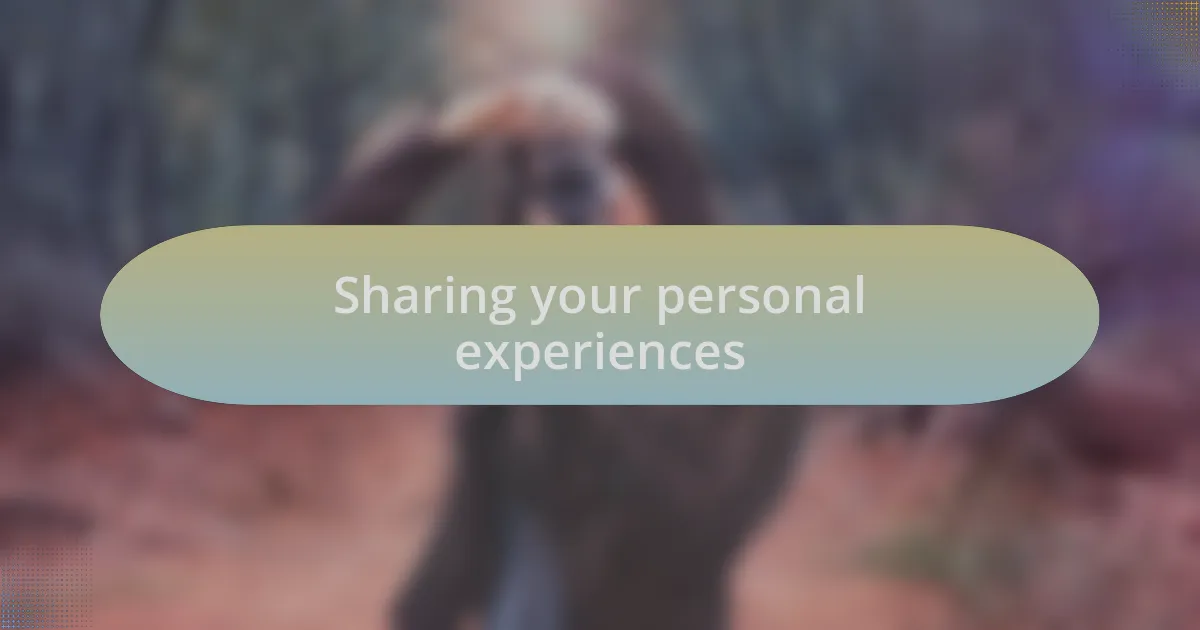
Sharing your personal experiences
When I think about sharing my personal experiences in critiques, one moment stands out: I was presenting a series of black-and-white street photographs. A fellow photographer pointed out the repetitive framing in some shots, which stung initially. But after reflecting on their feedback, I realized they were right. Have you ever felt your creative instincts were on autopilot? This experience pushed me to explore different perspectives, transforming my work significantly.
Another time, during a critique, someone emotionally connected with a candid photo I had taken of a stranger. They shared how the image reminded them of a lost loved one, which took me by surprise. This taught me the incredible impact of storytelling through visuals. Have you ever realized that your work can evoke feelings or memories you never intended? That revelation opened my eyes to the emotional depth that photography can convey.
Recently, I’ve started documenting my critiques in a journal. I jot down not only the feedback but also my reactions and thoughts after the discussions. It’s become a powerful tool for reflection, allowing me to revisit and analyze the insights over time. Have you ever kept a record of your critiques? This practice has helped me synthesize feedback, and it often sparks new ideas long after the session has ended.